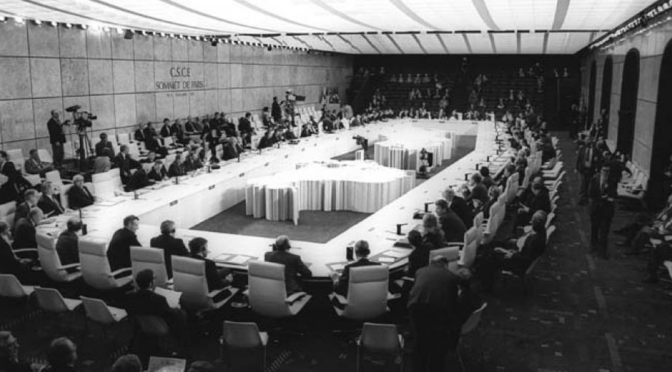Human Rights, Peace, and Security in Europe in the Perspective of Political Exile as a Non-State Actor in International Politics
This event is organised by the Institute of Contemporary History of the Czech Academy of Sciences in cooperation with CEFRES.
Date: October 21–23, 2025
Location: Archive of Parliament of the Czech Republic (Komunardů 1634/44, Prague 7)
Language: English
This year, we commemorate the 50th anniversary of the signature of the Helsinki Accords and the launch of the Helsinki Process, which significantly changed the political situation in Europe, leading to the collapse of the Eastern Bloc from 1989 to 1991. Through follow-up meetings of the Conference on Security and Cooperation in Europe (CSCE), many government representatives and non-governmental organizations in the West could criticize the undemocratic regimes in the East, particularly for their violations of human and civic rights. Alongside politicians, intellectuals, media, and human rights organizations engaged in the Helsinki Process and worked together with dissidents from the other side of the Iron Curtain. An important but so far unheeded actor was the political and cultural multi-generational exile from Central and Eastern Europe. These exile groups possessed political, cultural, and social capital to affect the Western political public in favor of their interpretation of the Helsinki Process. Moreover, the exiles were the essential mediators between the West and the dissidents in their homelands as they secured communication, information transfer, and material support in both directions.
Program
Tuesday October 21
Public debate with actors of dissidence and exile: Jan Kavan, Ivanka Lefeuvre, Martin Palouš, Jacques Rupnik and Anna Šabatová, moderated by a historian Michal Kopeček (Institute of Contemporary History of the Czech Academy of Sciences). The debate will take place on Tuesday, October 21, at 5 p.m. in the Institut français de Prague (Francouzský institut v Praze, Štěpánská 35, 110 00 Prague 1). It will be in Czech and interpreted into English.
If you are interested in participating, please pre-register here.
Workshop
The workshop´s main topic is the political exile as a non-state actor in international relations, 1970s–1990s. The scholars from various disciplines, such as history, political science, sociology, political geography, and others, were invited to map this complex phenomenon.
The workshop language is English, and the venue is the Archive of Parliament of the Czech Republic (Komunardů 1634/44, Prague 7).
The workshop is closed to the public. However, you can register to attend Panel 3 and Panel 4 using this registration form. Please note that you must register and produce your ID card at the reception.
Wednesday October 22
9:30 Greeting
9:45-11:15 Panel 1: Diverse Interpretations of Human Rights
- Anna Mazurkiewicz (University of Gdansk): Helsinki Conference As a “Funeral Ceremony for 100 Million People of Eastern Europe”
- Michaela Lenčéšová (Institute of Contemporary History, Czech Academy of Sciences): Human Rights and Slovak Political Emigration: Interpretations and Discussions
- Una Blagojević (Central European University – Babes Bolayi University): The Network of Yugoslav ‘Exiles’: Intellectuals and the Interpretations of Human Rights
11:15-11:30 Coffee Break
11:30-13:00 Panel 2: Helsinki in the Perspective of Political Leftist Exiles
- Kristina Andělová (Institute of Contemporary History, Czech Academy of Sciences): The Reflection of the Helsinki Accords by the Czechoslovak Socialist Opposition in Exile
- Maroš Timko (Institute of History, Czech Academy of Sciences): The Spanish Communist Exile in Czechoslovakia Between the Prague Spring and the CSCE (1968–1975)
- Tomáš Zahradníček (Institute of Contemporary History, Czech Academy of Sciences): The Czechoslovak Social Democrats in Exile and Hesitation about Policy of Human Rights
13:00-13:45 Lunch Break
13:45-15:15 Panel 3: The Role of Information Transfer Across the Iron Curtain
- Peter Jašek (Nation´s Memory Institute): Slovak Broadcast in West and Human Rights After the Helsinki Final Act
- Ioana Macrea-Toma (Central European University): What Does “Information” Mean in the Case of Human Rights Activism? Romanian Exile Actors As Knowledge Factotums
- Petr Orság (Palacký University Olomouc): From Sceptical Sirens of Helsinki to an Awakened Volcano: Exile (Not Only) Communication Networks and Making the Invisible Visible
15:15-15:35 Coffee Break
15:35-17:05 Panel 4: Multinational Exiles from the USSR
- Tatsiana Astrouskaya (Herder Institute Research Academy): The Helsinki Process and Hopes for National Revival. Belarusian Émigré Publishing in London After 1975
- Olga Rosenblum (Leibniz Center for Literary and Cultural Research): Mediating between the West and Russia as a Political or Humanitarian Act: Discussions and Practices in Pavel Litvinov’s Circle
- Lars Frederik Stöcker (University of Vienna): “A Lifeline to the West: Exchange and Cooperation between Ants Kippar’s Relief Centre for Estonian Prisoners of Conscience and the Soviet Estonian Dissident Community”
Thursday October 23
9:00 Opening
9:15-10:30 Panel 5: Position of Exiles in the Bipolar Europe
- Ana-Maria Cătănuș (“Dunarea de Jos” University of Galati): Fighting Goliath: Revisiting the Story of the Paris-Based Ligue for the Defence of Human Rights in Romania
- Kacper Szulecki (Norwegian Institute of International Affairs): Between Geopolitical Fantasies and Foreign Policy Blueprints: Central European Exilic Intellectuals and the Post-Cold War Order
10:30-10:50 Coffee Break
10:50-12:00 Panel 6: Exile, Opposition, and Memory
- Jakub Mikulecký (Institute of Slavonic Studies, Czech Academy of Sciences): Prisons and Labor Camps Themes in Bulgarian Exile Literature (1970–1989): Traumatic Memory as a Discursive Instrument of Psychological Warfare
- András Mink (Blinken Open Society Archive): 1956 Exiles and the Hungarian Opposition
12:10-13:00 Lunch Break
13:00-14:30 Panel 7: Human Rights as a Tool of Political Exiles´ Lobbing in the West
- Mioara Anton (Nicola Iorga Institute of History): The Romanian Exiles in the United Kingdom in the 1980s: The Campaigns to Defend Human Rights and Stop the Systematization of Villages
- Bernd Robionek (Humboldt University of Berlin): The Human Rights Issue in the anti-Communist Croatian Emigration
- Jakub Tyszkiewicz (University of Wrocław): Jan Nowak-Jeziorański’s Role in Shaping a Pro-Polish Lobby in the U.S. During the 1970s and 1980s
14:45-15:45 Final Debate

